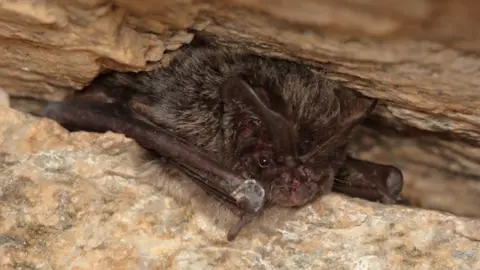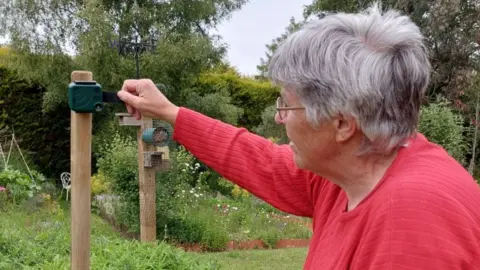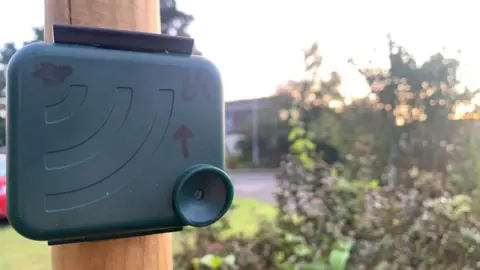Woodbridge: Rare Barbastelle bat found in volunteer garden survey
 Getty Images
Getty ImagesOne of the rarest bats in the UK has been spotted during a "citizen science" project in Suffolk.
Barbastelle bats were identified as one of 10 species seen in people's gardens in Woodbridge and Melton during a survey that used audio detectors.
The survey has fed into University of Suffolk research tracking changes in biodiversity and populations.
Volunteer Jane Healey said taking part in the project had brought the community together.
Bats are an indicator species and the variety of bats in an area helps inform researchers on types of insects and general habitat.
 Jane Healey
Jane HealeyMs Healey, of Transition Woodbridge, a local environmental group, said people of all ages had been taking part.
She said: "I have all sorts of conversations about it. Having had the Covid pandemic there's still a wish to be a community, so it's real 'citizen science'.
"It's nice for people to feel they are contributing to the national or international picture, even though it seems like 'just my garden'."
The project began last year with 80 bat posts being put up in gardens to record audio, which can be used to detect different species.
This year, the project more than doubled with 190 poles being erected across gardens, care homes and the National Trust site Sutton Hoo.
 Dr Mark Bowler
Dr Mark BowlerDr Mark Bowler, a spatial ecologist at the university, has been collecting the data as part of research on wildlife distributions and populations, and the impact humans have on them.
He said: "I remember as a kid people thinking bats were not a nice thing, associated them with Halloween. I don't see that side of things."
He added that people had been "excited" and got a "thrill" from the results of which species were in their gardens - and some had already made changes to make them more bat and insect friendly.
"Bats and insects are increasingly more reliant on suburban environments and we're finding more in this type of area," he said.
"The bigger picture is all bats are in decline, losing roosting sites and losing habitat."
Preliminary results from 2022 suggested there were up to 10 different species of bat in the area, ranging from the Common Pipistrelle to the rare Barbastelle.
Going forward, Dr Bowler said he would like to get more schools involved in the project.
 Richard Haugh/BBC
Richard Haugh/BBC
Follow East of England news on Facebook, Instagram and X. Got a story? Email [email protected] or WhatsApp us on 0800 169 1830
